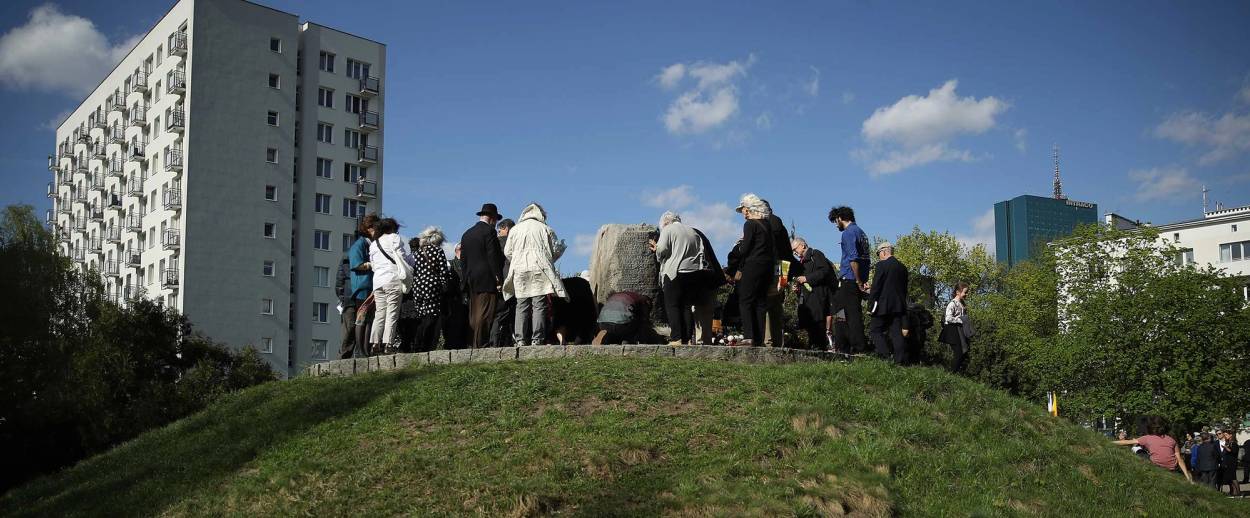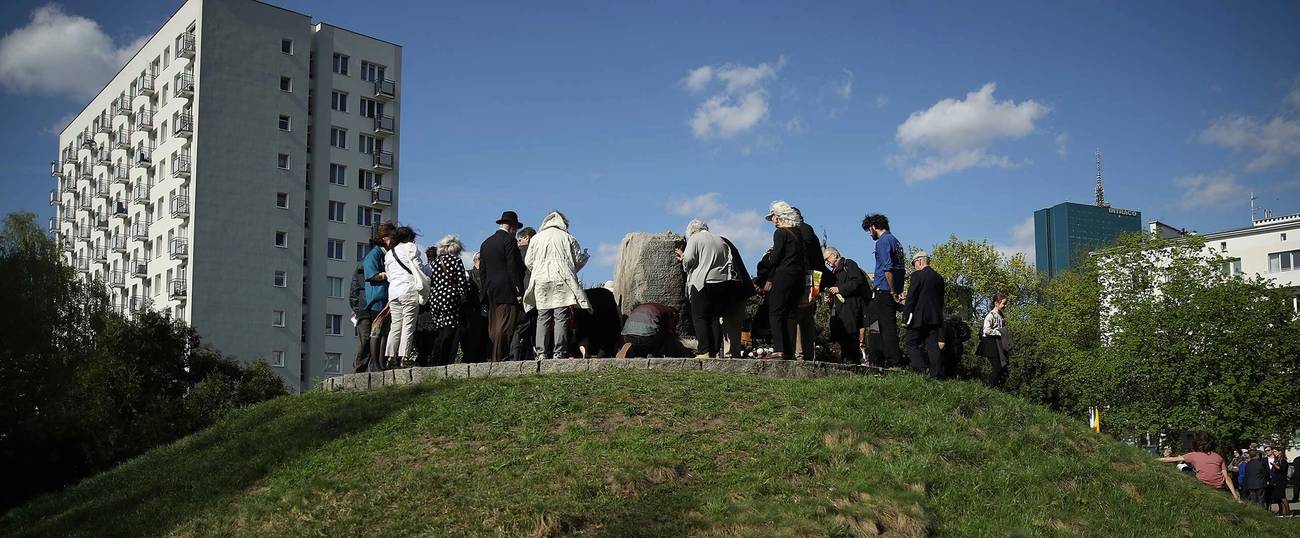The Warsaw Ghetto Uprising and the Living Challenge of Anti-Fascism
Lessons from World War II Poland for us today




My late father, Charles Slucki (Sluggo), used to tell me that April 19, the start of the Warsaw Ghetto uprising, is a heylige date, or holy day, his Yom Kippur; that even though he remembered the victims of the Holocaust every day, including his father’s first wife and two sons killed at Chelmno, it was on April 19 that he really paused to think about what it meant to honor their memories, and to think about how we ought to apply whatever lessons we might draw from the actions of the heroic fighters in the Warsaw Ghetto. Named for one of those murdered half-brothers, Shmuel, my father was adamant not only that we ought to remember the victims, but that their deaths ought to stoke in us a fire to make the world a better place, to lift up those around us.
I was raised under the imposing shadow of the fallen heroes of the Warsaw Ghetto and other martyred Bundists, their serious faces staring down from the walls of the Bund’s headquarters in Melbourne, Australia. The gentle features of Mikhl Klepfisz, the fatherly demeanor of Abrasha Blum, and the tragic and searching eyes of Shmuel Artur Zygielbojm reminded us constantly of their heroism, their bravery in the face of the Nazi machine, their willingness to sacrifice their lives for their comrades. In my home, Klepfisz, Dovidl Hochberg, Tobcie Dawidowicz, and the Blones children were household names.
It is a grave responsibility we carry, as inheritors of their legacy. But what is that legacy? Marek Edelman, last surviving commander of the uprising who died in 2009, once said that after the Holocaust, to be a Jew meant to always be on the side of the oppressed, never with the oppressor. He truly lived these values, his life marked by his struggles against both Nazism and Communism. His courageous example ought to remind us constantly that the legacy we carry 75 years on from the uprising is not only to see injustice where it exists, but to act against it, even where there are consequences for ourselves.
After the bloody outbreak of mob violence in Charlottesville, Va., less than a year ago, it’s more important than ever that in America, we remember the Holocaust and draw lessons from the senseless suffering inflicted on our loved ones. Charlottesville reminded us in the starkest terms that we must be vigilant in combatting anti-Semitism, to fight it in all its manifestations, whether on the right or left, in public and private spaces, in person and online. The recent past has unleashed a wave of neo-fascism and white supremacy. Anti-Semitism is now out in the open in this country in a way it has not been since the 1940s. We must identify it and fight it.
Yet we must also recognize that this historic battle is wrapped up in wider struggles for freedom, justice, and dignity. We must show our solidarity with all those whose daily struggles remind us that the Jews’ suffering is part of a broader attack on groups denied access to power. This is no time for complacency. As Jews, we must join the fight against the daily oppression of peoples of color, of immigrants, and refugees, whose suffering we recognize in the suffering of our own recent ancestors. As Jews, we must stand as allies alongside the LGBTQ community, who continue to be subject to state and social violence. As Jews, we must be a part of the ongoing struggle to protect the rights of women against a state that is trying to erode their bodily autonomy and is indifferent to women’s access to opportunities, livelihoods, and political participation. Anti-Semitism is only one side of the same coin as racism, misogyny, homophobia, and transphobia. Without protecting the rights and bodies of all, we Jews will never ourselves be safe.
***
There’s another message we ought to carry with us as we remember the tragic sacrifice of the Warsaw Ghetto heroes, and all the victims of the Nazi’s bloody campaigns. As Jews across the world today celebrate the 70th anniversary since the establishment of the State of Israel, we must constantly question what are the responsibilities of a Jewish state, a state with political and military power, and with access to a nuclear arsenal; a state with a substantial non-Jewish minority; a state that controls the fate of millions of non-Jews in Palestine. How can we, Jews across the world, ensure that the Jewish state fulfills its responsibility to the victims of the Holocaust by being on the side of the oppressed, and never the oppressor, as Marek Edelman taught us?
These are challenging questions, but necessary ones. If what we take from the valiant struggle of the heldn (heroes) is merely to look inward, then we have failed them. If we use the Holocaust as an excuse to shy away from the difficult work of self-criticism and introspection, then we have failed them. Our fight is part of a broader struggle for human dignity and freedom.
***
When my son was born in 2012, we named him Arthur, for Artur Zygielbojm. An onus on my son perhaps, yet one we all share, to ensure not only that his namesake’s memory is not forgotten, but that his sacrifice can arouse in us the will to stand up against injustice wherever and whenever we see it.
The following is an excerpt of Zygielbojm’s final letter to the Polish government-in-exile. The letter—and his suicide—was a plea for the world to take notice of the Jews’ suffering, of their sacrifice, and to intervene to stop the bloodiest massacre in history.
I cannot continue to live and to be silent while the remnants of Polish Jewry, whose representative I am, are being murdered. My comrades in the Warsaw Ghetto fell with arms in their hands in the last heroic battle. I was not permitted to fall like them, together with them, but I belong with them, to their mass grave.
By my death, I wish to give expression to my most profound protest against the inaction in which the world watches and permits the destruction of the Jewish people.
I know that there is no great value to the life of a man, especially today. But since I did not succeed in achieving it in my lifetime, perhaps I shall be able by my death to contribute to the arousing from lethargy of those who could and must act in order that even now, perhaps at the last moment, the handful of Polish Jews who are still alive can be saved from certain destruction.
My life belongs to the Jewish people of Poland, and therefore I hand it over to them now.
—Shmuel Artur Zygielbojm, 12 May 1943, London
Koved zeyer ondenk: Honor their memories.
***
You can help support Tablet’s unique brand of Jewish journalism. Click here to donate today.
David Slucki, assistant professor in Jewish studies at the College of Charleston, South Carolina, is the author ofThe International Jewish Labor Bund after 1945.